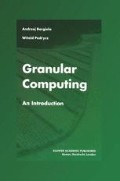Abstract
In the previous chapter, we introduced a model of collaboration between granular worlds. This model was quite general and showed how such collaboration was accomplished in the framework of fuzzy sets by being directly associated with the granular descriptors realized in the form of fuzzy clusters (fuzzy relations). In the proposed mechanisms of collaboration, we have made two assumptions that were consistently kept throughout the entire flow of investigations. First, the collaborative nature of the communication implies that all granular environments are treated in the same manner and there is no particular role being attached to any of them. Second, in virtue of the character of the collaboration, we considered the same number of information granules across all worlds. While these two assumptions are legitimate and apply to a broad range of cases, they can be augmented in several possible ways. The number of the information granules that can exist in each granular world needs not be the same; it is quite evident that the assumption we have made with this regard looks quite restrictive. Furthermore in the collaborative communication we may envision that there are some mappings between some granular worlds and this sense a set of information granules in one space (granular world) may impact the formation of the granules in some other space. The nature of the collaboration is then more directional as one of the granular worlds attempts to accommodate some “advice” coming from other environments; the advice is conveyed via some logic-based mapping expressed at the level of information granules.
Access this chapter
Tax calculation will be finalised at checkout
Purchases are for personal use only
Preview
Unable to display preview. Download preview PDF.
References
Bargiela, A., Pedrycz, W. (2001), Granular clustering with partial supervision, European Simulation Multiconference ESM2001, Prague, June 2001, 113–120.
Bezdek, J.C. (1981), Pattern Recognition with Fuzzy Objective Function Algorithms, Plenum Press, N. York.
Di Nola, A., S. Sessa, S., Pedrycz, W., E. Sanchez, E.(1989), Fuzzy Relational Equations and Their Applications in Knowledge Engineering, Kluwer Academic Press, Dordrecht.
Delgado, M., Gomez-Skarmeta, A. F., Martin, F. (1997), A fuzzy clustering-based prototyping for fuzzy rule-based modeling, IEEE Transactions on Fuzzy Systems, 5(2), 223–233.
Ma, M., Zhang,Y-Q., Langholz, G., Kandel, A. (2000), On direct construction of fuzzy systems, Fuzzy Sets and Systems, 112, 165–171.
Pedrycz, W. (1991), Neurocomputations in relational systems, IEEE Trans. on Pattern Analysis and Machine Intelligence, 13, 289–296.
Pedrycz, W., Rocha, A. (1993), Knowledge-based neural networks, IEEE Trans. on Fuzzy Systems, 1, 254–266.
Pedrycz, W. (1995), Fuzzy Sets Engineering, CRC Press, Boca Raton, Fl.
Pedrycz, W., Vasilakos, A.V. (1999), Linguistic models and linguistic modeling, IEEE Trans. on Systems Man and Cybernetics, 1999, 29(6), 745–757.
Setnes, M. (2000), Supervised fuzzy clustering for rule extraction, IEEE Transactions on Fuzzy Systems, 8(4), 2000, 416–424.
Sugeno, M., Yasukawa,T. (1993), A Fuzzy-logic-based approach to qualitative modeling, IEEE Transactions on Fuzzy Systems, 1(1), 7–31.
Zhang, Y.-Q., Kandel, A. (1998), Compensatory Genetic Fuzzy Neural Networks and Their Applications, World Scientific, Singapore.
Author information
Authors and Affiliations
Rights and permissions
Copyright information
© 2003 Springer Science+Business Media New York
About this chapter
Cite this chapter
Bargiela, A., Pedrycz, W. (2003). Directional Models of Granular Communication. In: Granular Computing. The Springer International Series in Engineering and Computer Science, vol 717. Springer, Boston, MA. https://doi.org/10.1007/978-1-4615-1033-8_13
Download citation
DOI: https://doi.org/10.1007/978-1-4615-1033-8_13
Publisher Name: Springer, Boston, MA
Print ISBN: 978-1-4613-5361-4
Online ISBN: 978-1-4615-1033-8
eBook Packages: Springer Book Archive

